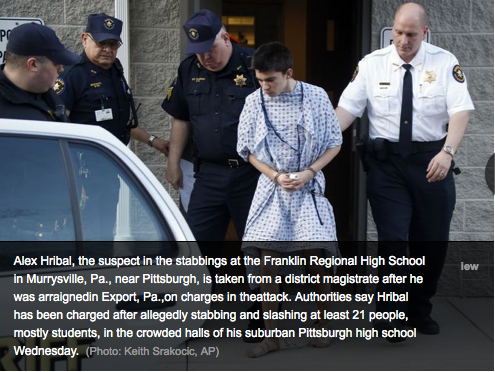
USA TODAY
Hours after a routine school day turned terrifying, students at Franklin Regional High School in Murrysville, Pa., described what they went through during the stabbing rampage that sent 20 people to hospitals today.
Some had gone home to feel safe. Some had to be with friends to work through their emotions.
As the horror began, students had just arrived for the first class. Some were still outside. Suddenly there was a commotion in the science wing.
“At first we just thought it was a group of boys being immature and fighting,” said sophomore Cameron Lazor, 16. “Then we saw the blood and realized it was something scary.”
“I saw a senior girl, and she was gushing blood down her arm.” said Mia Meixler, 16, a sophomore. “I didn’t think anyone saw her but me, so I tried to help her. I asked if she wanted to go to the nurse. But then all the kids started running and screaming down the hall. A teacher got to the girl and told me to run out.”
Junior Nicole Damico, 16, was on the second floor of the school when the fire alarm went off. She and her friends thought it was a drill, so they slowly made their way downstairs, where they discovered something serious was going on.
“We saw two kids down the hall, and it looked like they were play fighting,” Nicole said. “I realized that one had a knife, so we sprinted out of the school. I saw one of my peers near the entrance of the school who had blood everywhere. He asked me for help. I just froze and ran out of the school. After that there was chaos.”
Meanwhile, the suspect began to chase sophomore Trinity McCool, 16, as she and a friend fled.
“When he was chasing us, I saw his face — the look in his eyes. I was horrified,” she said.
Trinity and her friend made it out of the school unharmed, but Trinity said she was rattled by the event and went home.
Senior Tanya Leeman, 17, had just gotten to school when the fire alarm went off and was still in her car. Her sister, a sophomore, was stuck inside until police let everyone leave four hours later.
Because her sister did not have a phone with her, Tanya said, she was worried as she waited to hear that her sister was all right.
“I was scared because we didn’t know how many kids had gotten slashed or were missing,” she said.
“It was so unreal for all of us,” Tanya said. “We weren’t expecting something to happen at Franklin. We watched what happened in Connecticut on TV and thought that would never happen here.”
Nicole also made it safely out of the school.
“Us kids have been through hell and back,” she said. “It made me realize that anything could happen at anytime. It was just a regular day.”
Cameron said he was too shaken up to go home by himself.
“I’m with some friends because we didn’t want to be alone today,” he said. “We can’t believe it’s real. The whole situation keeps playing over and over in our heads.”
Mia said, “I think we’re all really scared, but it’s also nice that our whole community is coming together.”
Nicole agreed.
“Times like these, everyone just freaks out, and you don’t know what to do,” she said. “My peers have saved people’s lives. It started off scary and chaotic, but it’s amazing to hear how we’ve stuck together as a family.”
Psychiatrist and trauma specialist Steven Berkowitz said all the students, not just those physically injured, will wrestle with the experience — especially those who witnessed the bloody scene.
“In these kinds of situations, the psychological casualties usually outnumber the physical casualties,” he said. “It’s not just the kids who were stabbed, but all the kids at the school.”
Berkowitz, an associate professor of psychiatry at the University of Pennsylvania’s Perelman School of Medicine and the director of the Penn Center for Youth and Family Trauma Response and Recovery, said students and their parents may experience symptoms of psychological distress, including trouble sleeping, intrusive thoughts about the incident and mood swings. In some cases, students may have post-traumatic stress disorder, depression or turn to substance abuse, he said.
The children may fear going to school, “and parents will be afraid to send them,” Berkowitz said. He advises parents to get their kids back to school and their normal routine.
“One of the most important things … is to get back on the horse. It’s really true,” he said. “The more you let it interfere with your normal routines, the harder it will be in the long term.”
Students will have a wide range of responses depending on their physical and emotional connection to the stabbing and their natural emotional makeup.
“There are individuals who are going to be more resilient than others,” he said. “This is the kind of large-scale event where so many kids were exposed. They saw it. They heard it. They had friends who were hurt. Early interventions and monitoring are really, really key and crucial.”

